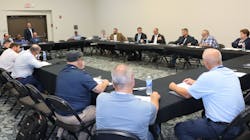Like any good businessman, Kevin Jackson saw a need and supplied the solution. Only this problem was a lack of peers—and the best way to solve it was by committee.
The result of the Liquid Cargo president’s years-long effort to establish a home for up-and-coming executives is National Tank Truck Carriers’ Young Executives Committee (YEC), which was adopted into NTTC’s by-laws and awarded a seat on its Executive Committee (EC) in 2019, a year before he began his ill-fated tenure as 2020-21 chairman. NTTC’s version of LEAD ATA now is part of Jackson’s legacy, but he humbly downplays the achievement. “When there’s a need, the creation of a new committee isn’t hard,” he said.
Today there are more than a dozen essential committees in the tank truck industry’s trade association, each with a unique purpose powered by industry participation, from the Board of Directors and the EC, to the Safety & Security Council, sub-committees for key segments, and NTTC’s newest groups—YEC, and the Workforce Committee.
“Engagement is priority No. 1,” said Ryan Streblow, NTTC president and CEO. “Those who gain the most out of NTTC are those who are involved in one way, shape, or form.”
Young Executives Committee
Jackson was just shy of 30 when he joined the association. Back then, he says, membership was aging along with the workforce, and young members were uncommon. “I knew there were young individuals, like family members and up-and-coming executives, who weren’t attending,” he said. “And shortly thereafter, ATA put together its LEAD program for young executives, and I thought, ‘NTTC needs something like that.’”
LEAD debuted in 2013. The next year, Jackson went before the nominating committee to discuss his path to chairmanship. They’d heard him talk about establishing a group for young leaders—and told him to start right away. “So I rounded up six people under the age of 45 and we held our first meeting at a high-top table in the conference showroom, and it was like, ‘This is the start, so get it out there, and let people know we’re putting together a committee,’” Jackson recalled.
It was more of a club in the early days. Members gathered to socialize, network, and learn about each other, and their respective businesses. Jackson was their first informal leader, and first chair after YEC officially was endorsed. David Price, now United Petroleum Transports’ executive vice chairman, followed when Jackson became NTTC chairman, and helped YEC evolve into a more structured endeavor. Now they regularly enlist expert speakers, including past NTTC chairs, to talk about the association, how to get involved, and pressing industry issues like cybersecurity—the topic of their most recent gathering.
“Unfortunately, Kevin was robbed in his chairmanship due to COVID, with no in-person events,” Streblow said. “Yet here’s an individual who did so much front-end work he still walked away with a huge accomplishment, and recognition by the association and its members of the critical nature of the committee within our association in helping get young professionals ingrained in the tank truck segment,” Streblow said.
Jackson insists YEC is important for several reasons. A “youthful voice” that can supply ingrained leadership with “fresh ideas” is critical to the long-term viability of any organization. It’s also important for hopefuls to see a path to association leadership, and have mentors who understand their generational challenges.
“I love all the people I’ve meet during my time at NTTC,” Jackson said. “I’m 41 now, so I’ve been here 12 years. But it was important to me to be able to relate to people in my shoes, and the individuals mentoring me and giving me guidance then hadn’t been in my shoes recently. They were at one point, but they were from a different generation. It’s a new age, and I wanted to talk to people who I related to on a different level.”’
He isn’t the only one. Jackson estimates more than 75 people have attended a meeting since the committee’s inception. “That’s terrific,” he said. “When I started, I was one of a handful of young individuals who attended NTTC events,” he said. “Now we have a much larger group participating, and people call and ask, ‘How do I get my son or daughter involved? I’ve heard about the group and think it’s a great opportunity.’
“And that was the goal—to drive engagement.”
Board, Executive, and Nominating Committees
The Board of Directors, open to all past chairmen, is NTTC’s highest governing body. It exists to “promote the objectives and purposes” of the association. The EC houses the association’s top officers, including the current chairman, vice-chairs, president, secretary, treasurer, at-large members, and chairs of “standing” committees; and appoints NTTC’s “corporate” staff, including Streblow, Moira Smith, the vice president of finance and administration, and Will Lusk, manager of education and government relations.
Board and EC members—who recently finalized NTTC’s events through 2024—are installed by the Nominating Committee, which consists of elected individuals and past chairmen. “They’re people who have gone through the process, led the association, and are looking at the next generation, saying, ‘Who do we want to continue to migrate through the ranks?’” Streblow said.
EC members know four to five years out if they’ll serve as chairmen, Streblow said. They proceed from second vice-chair to first vice-chair, then chairman of the board, before moving to Executive Committee chair and finally Nominating chair, where Jackson heads next in his last official capacity with the committee.
Budget & Finance, Audit Committees
The Budget and Finance Committee includes the treasurer and committee chair, currently Trimac Transportation president and CEO Matt Faure, and other key officers. The committee’s chair delivers budget recommendations and quarterly reports to the board, and presents the yearly audit at the Annual Conference.
The Audit Committee, chaired by Ventura Transfer chairman and CEO Randy Clifford—who’s also the first vice-chair and incoming NTTC chairman—monitors and reviews the association’s corporate finances and books.
Advocacy Committee
The Advocacy Committee monitors, recommends and establishes NTTC’s legislative priorities and recommend strategies for advancing tank truck causes. These are people who’ve engaged with the association for many years, Streblow said. They understand its inner workings, the historical trajectory of NTTC’s strategic-priority “tiers,” and how their decisions impact the association now and into the future.
“Our mission is to champion safety and success in the tank truck community through advocacy and education,” Jackson said. “So the advocacy committee is important because, A, it’s part of our mission, and B, it sets the regulatory and political agenda for the NTTC, and how we want to work with regulatory groups and politicians to support, defend, educate, and better the tank truck segment of the industry in North America.
“So that doesn’t just affect me or the membership, it affects anybody who operates a tank truck company. It’s one of the biggest reasons why I encourage any tank truck company to become a part of NTTC.”
Tank Cleaning, Safety Councils
The Tank Wash Council recently changed its name to the Tank Cleaning and Maintenance Council to better encompass its mission to promote safety and identify issues and solutions concerning cargo tank cleaning and maintenance for all commodities. The Safety and Security Council is led by four regional chairs and a national chair. Their mission is to improve the safety environment of the tank truck industry at all levels.
These groups have the most members, with 64 in the Tank Cleaning and Maintenance Council, and 44 in the Safety and Security Council.
“Our maintenance folks are involved in all of NTTC’s maintenance groups,” said Rob Sandlin, NTTC chairman and Florida Rock & Tank Lines president and CEO. “That way we’re able to come up with the best gameplan based on challenges facing the industry today.”
Workforce Committee
The Workforce Committee, chaired by Groendyke VP Holly McCormick, is NTTC’s newest and most popular committee, given the workforce challenges confronting the industry. “There were more attendees at the first Workforce Committee meeting than have attended all the YEC meetings the last three year combined,” Jackson quipped. “Every company wants people there because it’s a problem we’re all experiencing.”
They’re currently working with the Department of Labor to create a tank truck-specific registered apprenticeship program Streblow hopes to unveil in San Diego. “If we can get that done, it’ll be a major win for the tank truck industry,” Sandlin said.
Jackson said their contributions already were key in NTTC’s efforts to help establish the overall industry’s first registered apprenticeship programs. “That’s something we’ve all been working toward for ages,” he said. “And without participation, without discussion, and members who are engaged, it wouldn’t have occurred.”
Get engaged
The Chemical and Food, Dry Bulk, and Energy Services segment committees are equally important avenues to participation, which begins with membership.
The association has three types of members: For-hire tank truck carriers; private fleet operators, jobbers, and distributors; and industry suppliers. Only carrier members can hold an NTTC office and vote in meetings. NTTC currently has an even split of approximately 250 carrier and fleet members, and 250 associate members.
“What’s an association without membership?” Jackson said. “And what’s membership without engagement? If you don’t have members who are engaged in the association, then you truly don’t have an association. You just have people who are throwing money at something and there’s no real direction.
“The committees bring us together.”
Streblow suggests the best way to “test drive” NTTC is to attend Tank Truck Week or the Annual Conference, which are open to non-members. And to those who are worried about the commitment, he says time is money—and they can be wasted reacting to problems, or proactively invested in their elimination.
“We need input and different ideas from people across this industry, at all age levels—not just senior management—so we can come up with the best ideas and plans to move our industry forward,” Sandlin said.
About the Author
Jason McDaniel
Jason McDaniel, based in the Houston TX area, has more than 20 years of experience as an award-winning journalist. He spent 15 writing and editing for daily newspapers, including the Houston Chronicle, and began covering the commercial vehicle industry in 2018. He was named editor of Bulk Transporter and Refrigerated Transporter magazines in July 2020.



